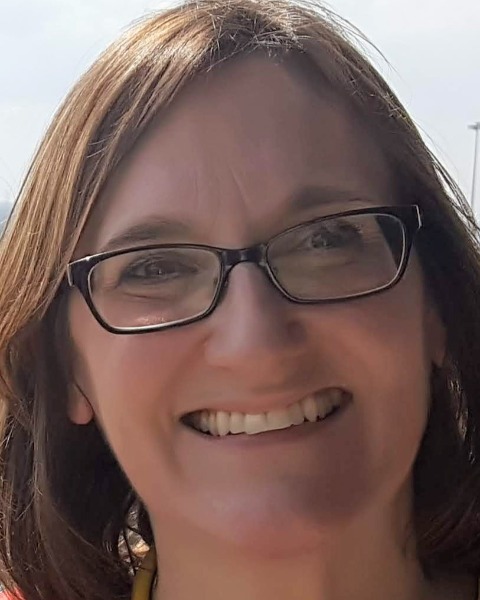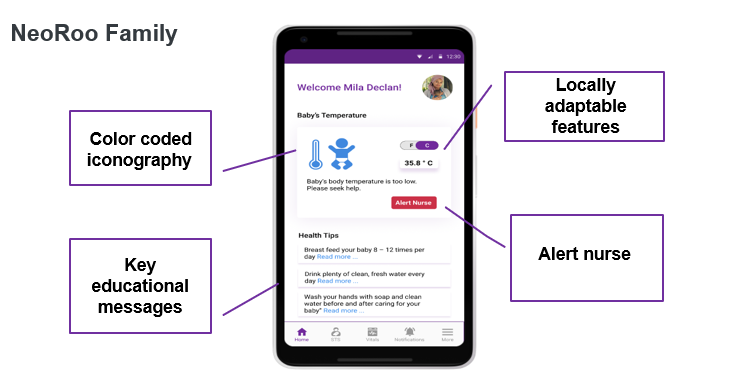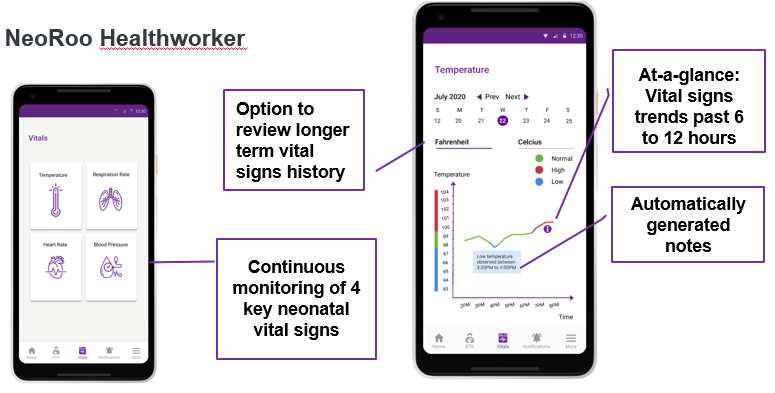Social Media & Technology
Category: Abstract Submission
Social Media & Technology I
550 - NeoRoo: Design of high-fidelity prototypes for an integrated mHealth platform to improve implementation of Kangaroo Mother Care in low/middle-income countries
Saturday, April 23, 2022
3:30 PM - 6:00 PM US MT
Poster Number: 550
Publication Number: 550.245
Publication Number: 550.245
Sherri L. Bucher, Indiana University School of Medicine, Indianapolis, IN, United States; Saptarshi Purkayastha, Indiana University Purdue University Indianapolis, Indianapolis, IN, United States; Osayame A. Ekhaguere, Indiana University School of Medicine, Carmel, IN, United States; Jacqueline C. Linnes, Purdue University, West Lafayette, IN, United States; FABIAN O. ESAMAI, Alliance for Maternal and Child Health, BUSIA, Western, Kenya

Sherri L. Bucher, PhD, MA (she/her/hers)
Associate Professor of Pediatrics, Neonatal-Perinatal Medicine
Indiana University
Indianapolis, Indiana, United States
Presenting Author(s)
Background: There are 15 million preterm births a year. Premature babies suffer the highest rates of newborn mortality, occurring primarily in low/middle-income countries (LMICs). Neonatal hypothermia (low body temperature) is a life-threatening complication, which is prevented by Kangaroo Mother Care (KMC), but in low/middle-income countries (LMICs), a profound shortage of health workers and lack of resources are barriers to KMC
Objective: Our international team aims to develop a DHIS-2 integrated platform (educational and data collection apps + biomedical device) to improve the implementation of KMC within health facilities.
Design/Methods: From August 2020 – February 2021, a multi-disciplinary team from the United States and Kenya utilized agile development (weekly scrum meetings) and human-and user-centered design techniques to develop high-fidelity wireframes (Figma) of Android apps which are designed to integrate with a patented self-warming biomedical device (NeoWarm; US10390630B2; NG/PT/IC/2016/053394) that utilizes wireless sensors to track KMC babies, continuously monitor infant vital signs, and display physiological data on mobile phones/tablets.
Results: High-fidelity wireframes have been developed for two user interfaces of an integrated app, NeoRoo. The NeoRoo-Family app (Figure 1) is for KMC parents; the NeoRoo-HealthWorker app (Figure 2) is built for nurses and doctors. NeoRoo-Family provides parental caregivers with: (a) automated monitoring of key vital signs for their baby; (c) ability to alert a clinician as needed; (c) tracking of KMC metrics and goals, such as number of hours of skin-to-skin care completed in a week; and (d) educational resources for evidence-based newborn care. The NeoRoo-HealthWorker app interface enables clinicians to: (a) simultaneously track breathing, heart rate, temperature, and oxygen saturation for multiple KMC infants in real-time; (b) review each infant’s past clinical history and vital signs trends; (c) receive automated and parent-generated alerts; (d) support harmonized dissemination of key educational messages to families.Conclusion(s): By providing harmonized education, continuous thermal support, and integrated, automated vital signs monitoring for premature babies, via the integrated NeoRoo mHealth platform, we hope to better equip parents and health workers in LMICs to: (1) prevent neonatal hypothermia; (2) automatically monitor vital signs in newborns; (3) track key KMC metrics; (4) promote more effective task-sharing among KMC teams. On-going work includes participatory design interviews and a usability assessment
Figure 1 The NeoRoo-Family app has a locally customizable user-interface that is specifically designed to support family caregivers for KMC dyads in low/middle-income health facilities
The NeoRoo-Family app has a locally customizable user-interface that is specifically designed to support family caregivers for KMC dyads in low/middle-income health facilities
Figure 2 The NeoRoo-HealthWorker app incorporates a number of functions and features designed to improve the efficiency, and reduce cognitive burden, for health care providers of KMC dyads in low/middle-income countries.
The NeoRoo-HealthWorker app incorporates a number of functions and features designed to improve the efficiency, and reduce cognitive burden, for health care providers of KMC dyads in low/middle-income countries.
Objective: Our international team aims to develop a DHIS-2 integrated platform (educational and data collection apps + biomedical device) to improve the implementation of KMC within health facilities.
Design/Methods: From August 2020 – February 2021, a multi-disciplinary team from the United States and Kenya utilized agile development (weekly scrum meetings) and human-and user-centered design techniques to develop high-fidelity wireframes (Figma) of Android apps which are designed to integrate with a patented self-warming biomedical device (NeoWarm; US10390630B2; NG/PT/IC/2016/053394) that utilizes wireless sensors to track KMC babies, continuously monitor infant vital signs, and display physiological data on mobile phones/tablets.
Results: High-fidelity wireframes have been developed for two user interfaces of an integrated app, NeoRoo. The NeoRoo-Family app (Figure 1) is for KMC parents; the NeoRoo-HealthWorker app (Figure 2) is built for nurses and doctors. NeoRoo-Family provides parental caregivers with: (a) automated monitoring of key vital signs for their baby; (c) ability to alert a clinician as needed; (c) tracking of KMC metrics and goals, such as number of hours of skin-to-skin care completed in a week; and (d) educational resources for evidence-based newborn care. The NeoRoo-HealthWorker app interface enables clinicians to: (a) simultaneously track breathing, heart rate, temperature, and oxygen saturation for multiple KMC infants in real-time; (b) review each infant’s past clinical history and vital signs trends; (c) receive automated and parent-generated alerts; (d) support harmonized dissemination of key educational messages to families.Conclusion(s): By providing harmonized education, continuous thermal support, and integrated, automated vital signs monitoring for premature babies, via the integrated NeoRoo mHealth platform, we hope to better equip parents and health workers in LMICs to: (1) prevent neonatal hypothermia; (2) automatically monitor vital signs in newborns; (3) track key KMC metrics; (4) promote more effective task-sharing among KMC teams. On-going work includes participatory design interviews and a usability assessment
Figure 1
 The NeoRoo-Family app has a locally customizable user-interface that is specifically designed to support family caregivers for KMC dyads in low/middle-income health facilities
The NeoRoo-Family app has a locally customizable user-interface that is specifically designed to support family caregivers for KMC dyads in low/middle-income health facilitiesFigure 2
 The NeoRoo-HealthWorker app incorporates a number of functions and features designed to improve the efficiency, and reduce cognitive burden, for health care providers of KMC dyads in low/middle-income countries.
The NeoRoo-HealthWorker app incorporates a number of functions and features designed to improve the efficiency, and reduce cognitive burden, for health care providers of KMC dyads in low/middle-income countries.